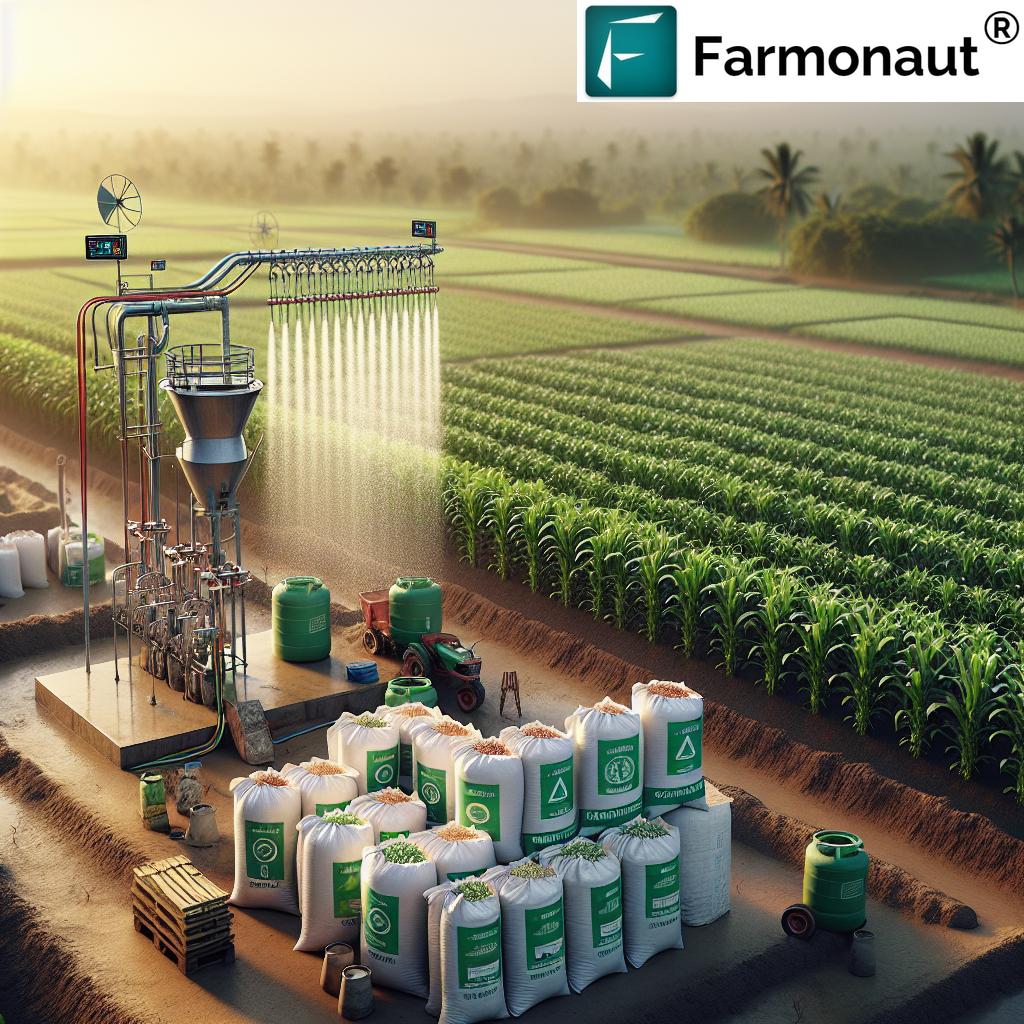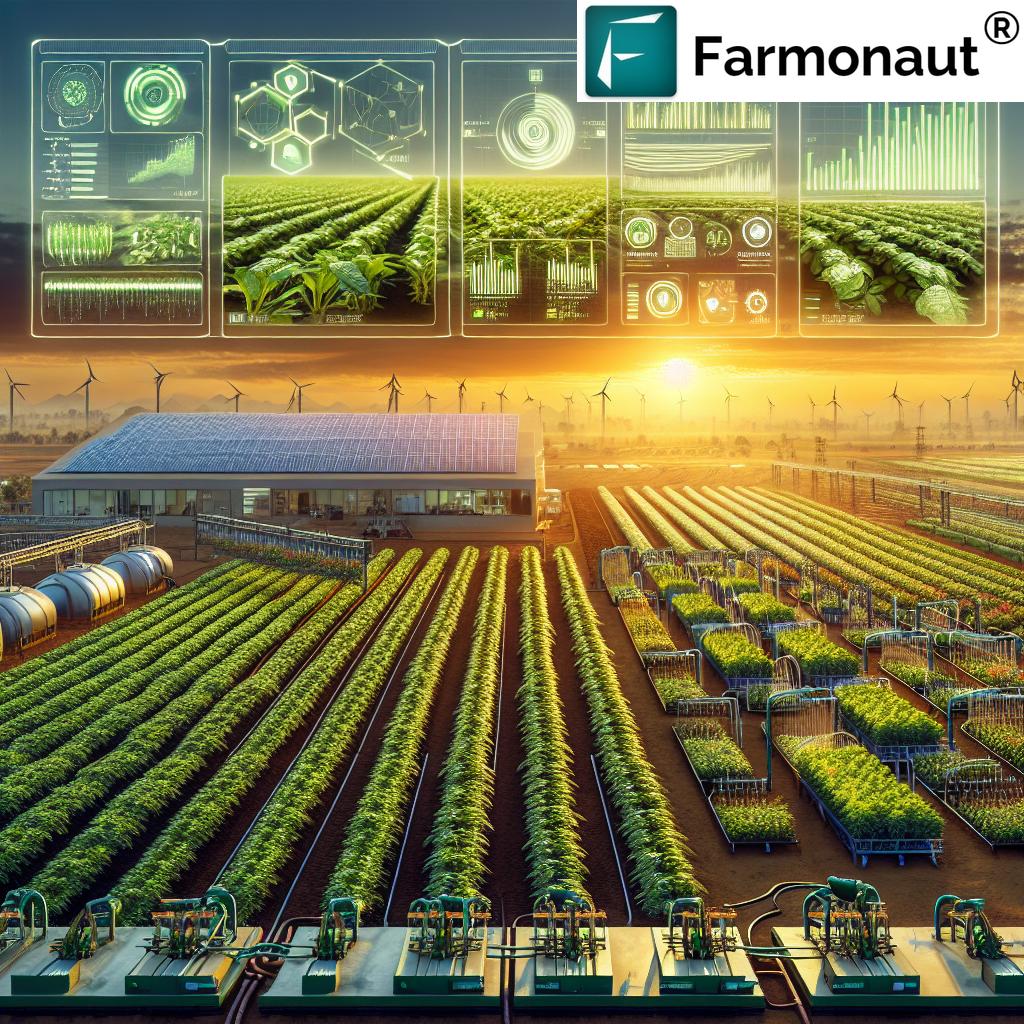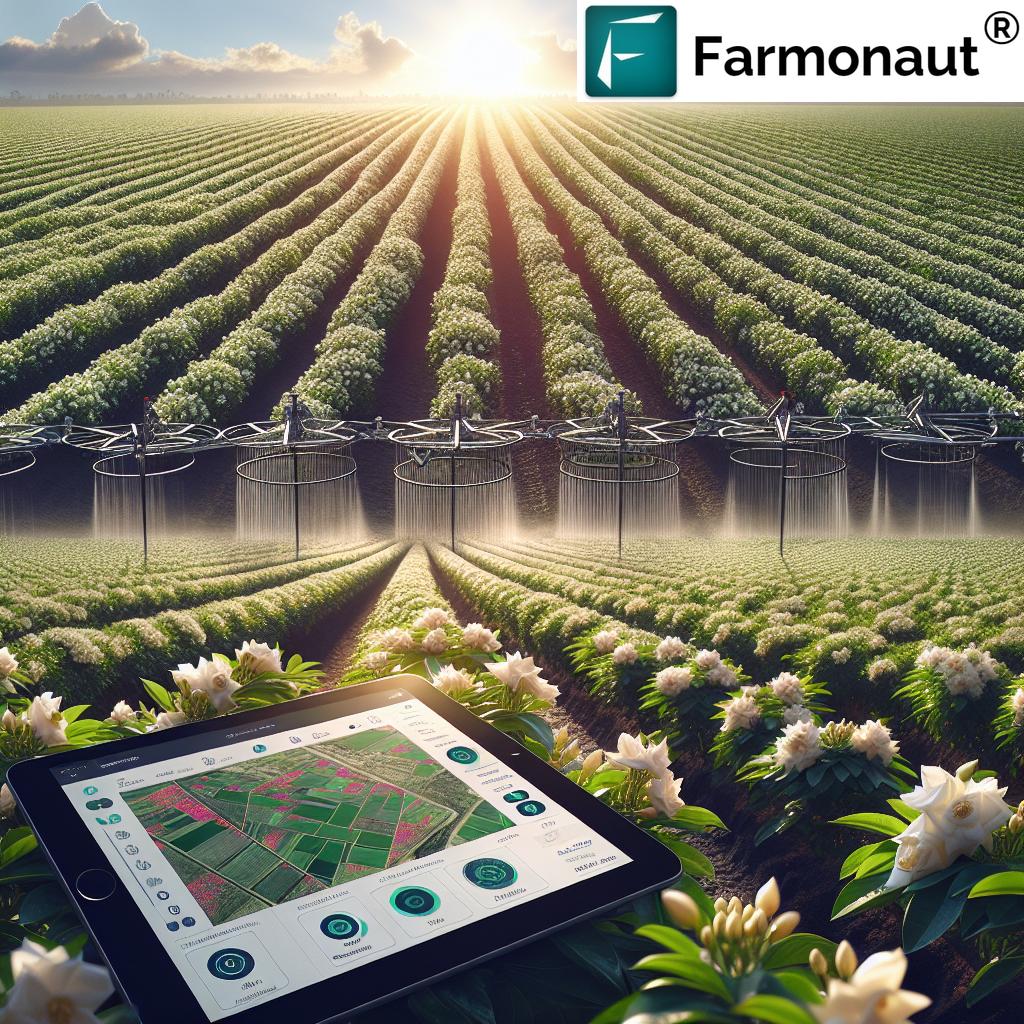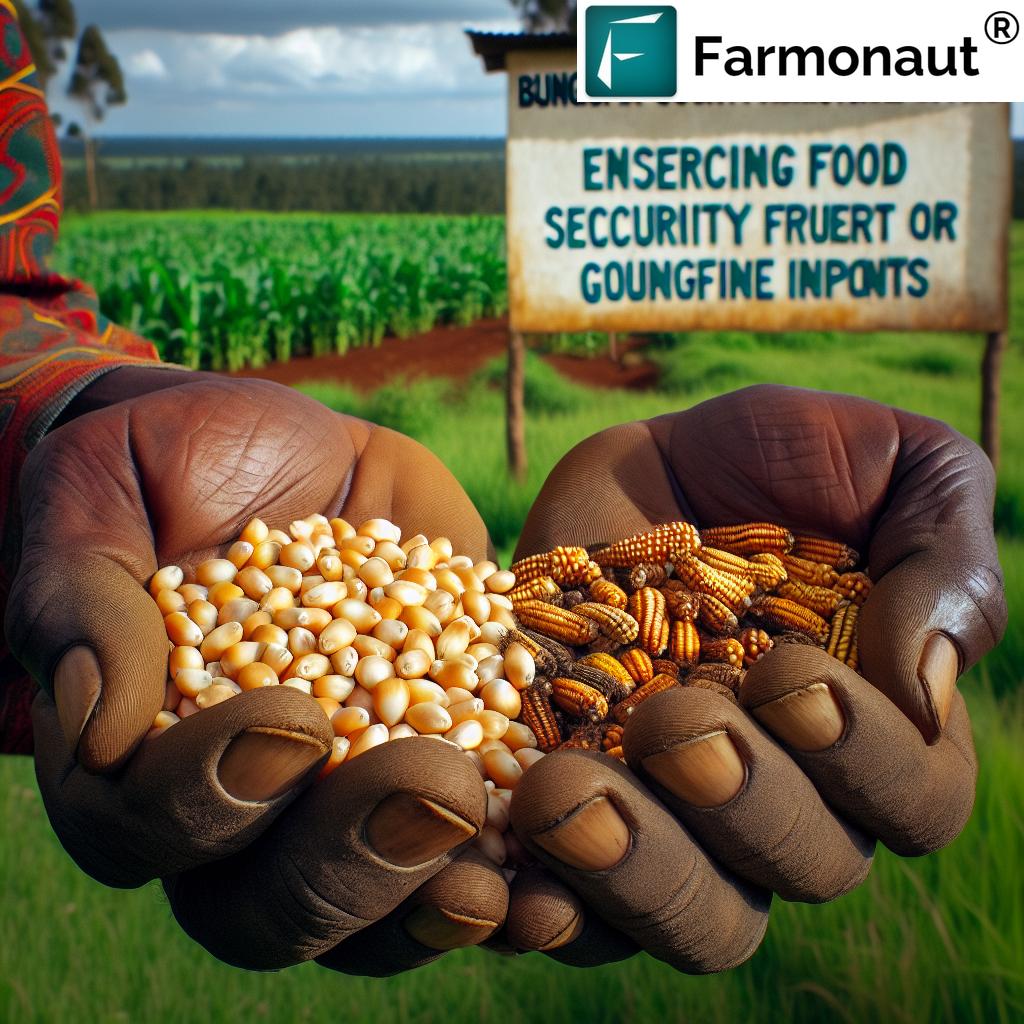Revolutionizing Rwanda’s Agriculture: How Sustainable Fertilizer Programs Boost Smallholder Productivity
“Rwanda’s new fertilizer blending facility can produce 100,000 tonnes annually, tailoring nutrient blends to specific soil needs.”
In the heart of Africa, a quiet revolution is taking place that promises to transform the agricultural landscape of Rwanda. We are witnessing the dawn of a new era in sustainable agriculture, where innovative programs are empowering smallholder farmers and reshaping the way agricultural inputs are distributed. At the forefront of this transformation is a groundbreaking initiative that not only recognizes but also rewards the efforts of top-performing agro-dealers and farmers who are instrumental in improving the food system and soil fertility management across the nation.
As we delve into the intricacies of this customer loyalty program, we’ll explore how it’s streamlining fertilizer distribution, especially in remote areas, while simultaneously promoting precision agriculture techniques. The impact of this initiative is far-reaching, with tangible results in increased crop productivity and improved livelihoods for participants. Let’s embark on a journey to discover how this innovative approach is transforming agricultural economic zones and bolstering food security in Rwanda and beyond.
The Agro-dealer Champion Program: A Catalyst for Change
At the heart of Rwanda’s agricultural revolution lies the Agro-dealer Champion Program (ACP), a visionary initiative launched by the Rwanda Fertilizer Company (RFC), a subsidiary of OCP Africa. This customer loyalty program is designed to recognize and reward the unsung heroes of Rwanda’s food system – the agro-dealers and farmers who play a pivotal role in enhancing access to agricultural inputs.
The program’s inauguration on December 6, 2024, at RFC’s state-of-the-art facility in the Bugesera Special Economic Zone, marked a significant milestone in the country’s journey towards sustainable agriculture. During this event, agro-dealers and farmers were given an exclusive tour of the factory operations, providing them with firsthand insight into the innovative processes that are shaping the future of farming in Rwanda.
Rewarding Excellence in Agricultural Input Distribution
- Top three agro-dealers receive brand-new motor tricycles
- Seven additional agro-dealers receive valuable gifts
- Ten most loyal farmers are recognized with rewards
These incentives are more than just prizes; they are tools of empowerment. By providing motor tricycles, the ACP is directly addressing one of the most significant challenges in agricultural input distribution – reaching remote areas. This forward-thinking approach not only enhances communication and streamlines ordering processes but also builds a cooperative RFC community that is united in its goal to revolutionize Rwanda’s agricultural sector.
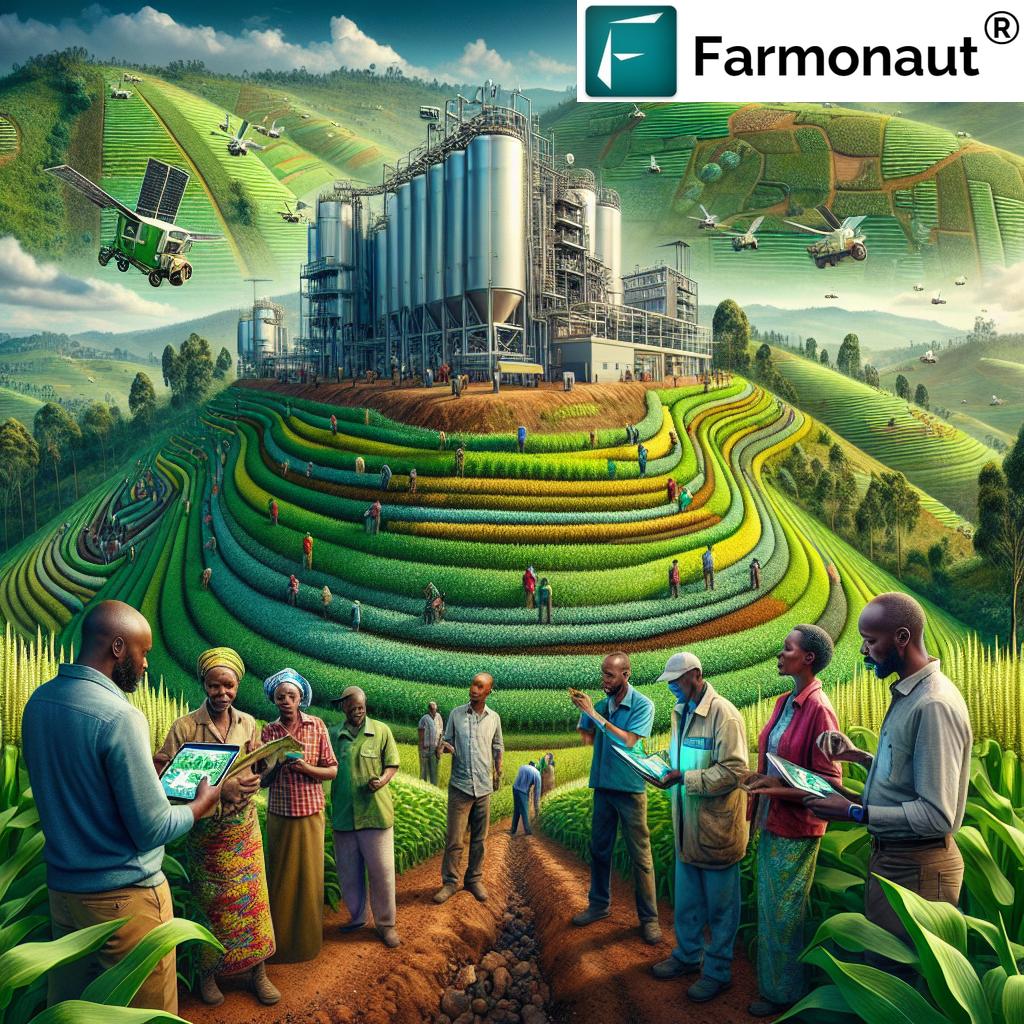
The Crucial Role of Agro-dealers in Rwanda’s Agricultural Landscape
In the intricate web of Rwanda’s agricultural ecosystem, agro-dealers stand out as the linchpins of progress. These enterprising individuals are not merely merchants; they are the sole market agents authorized to distribute subsidized inputs such as fertilizers and seeds directly to farmers. Their role is pivotal in bridging the gap between agricultural innovation and on-the-ground implementation.
The impact of the ACP on local livelihoods is profound, as evidenced by the testimonials of awardees like Claudine Mushirarungu. Her story is a testament to the transformative power of sustainable agriculture programs in Rwanda. Claudine shared how RFC’s credit system for affordable fertilizers has dramatically improved her family’s financial situation, enabling her to invest in land and housing while providing employment opportunities for her children in her agro-dealership.
But the benefits don’t stop at economic empowerment. Claudine reported that her potato production doubled after receiving tailored fertilizer recommendations from RFC. This remarkable increase in yield underscores the importance of precision agriculture techniques and the value of customized soil fertility management strategies.
Success Stories from the Field
Epimaque Barihenda, another successful agro-dealer, recounted his journey of accumulating substantial wealth through his dealership. He credits RFC for providing accessible fertilizer supplies on deferred payment terms, a system that has allowed him to grow his business and contribute to the agricultural development of his community.
Angelique Nyiramuhanda’s experience highlights another crucial aspect of the ACP – its focus on improving fertilizer distribution to remote areas. Her tri-motorcycle award is set to bolster her ability to reach farmers in distant regions, ensuring that the benefits of advanced agricultural inputs are not limited to easily accessible locations.
RFC’s Commitment to Tailored Solutions and Transparency
Anass Khanchoufi, the Managing Director of RFC, has been vocal in his praise for the dedication shown by agro-dealers and farmers in utilizing RFC’s specifically blended fertilizers. These custom formulations are not created in a vacuum; they are the result of meticulous soil testing and analysis, designed to meet the unique soil and crop nutrient needs of Rwanda’s diverse agricultural landscape.
The company’s commitment to transparency in production quality is unwavering. RFC has invested in an advanced laboratory and participates in the OCP School Lab project, which already serves 14 districts across Rwanda. This initiative is crucial for promoting precision agriculture techniques and ensuring that farmers have access to the most up-to-date soil fertility management strategies.
The Blending Plant: A Game-Changer for Rwanda’s Agriculture
The blending plant at RFC, which became operational on December 20, 2023, is a testament to the country’s commitment to agricultural self-sufficiency. With a capacity of 100,000 tonnes of fertilizers per year, it surpasses Rwanda’s current demand of 85,000 tonnes, positioning the country as a potential exporter of custom-blended fertilizers in the future.
One of the standout products from this facility is the NPK 17-17-17 Tweze blend. What makes this fertilizer unique is its adjustment with lime, a crucial addition that addresses the prevalent issue of soil acidity in Rwanda. This tailored approach to fertilizer blending demonstrates RFC’s dedication to solving specific agricultural challenges faced by Rwandan farmers.
“Sustainable agriculture programs in Rwanda are boosting crop productivity and improving livelihoods for smallholder farmers across the country.”
The Annual Recognition Event: Strengthening Agricultural Resilience
The ACP is not a one-off initiative; it is set to become an annual recognition event that will continually strengthen the relationship between RFC, agro-dealers, and farmers. This ongoing commitment ensures a more resilient agricultural framework in Rwanda, one that is adaptive to changing needs and challenges.
By fostering these relationships and recognizing excellence, the ACP does more than just support the local economy. It contributes to the overarching goal of enhancing agricultural productivity and food security in the nation. This holistic approach to agricultural development is what sets Rwanda apart in its journey towards sustainable agriculture in Africa.
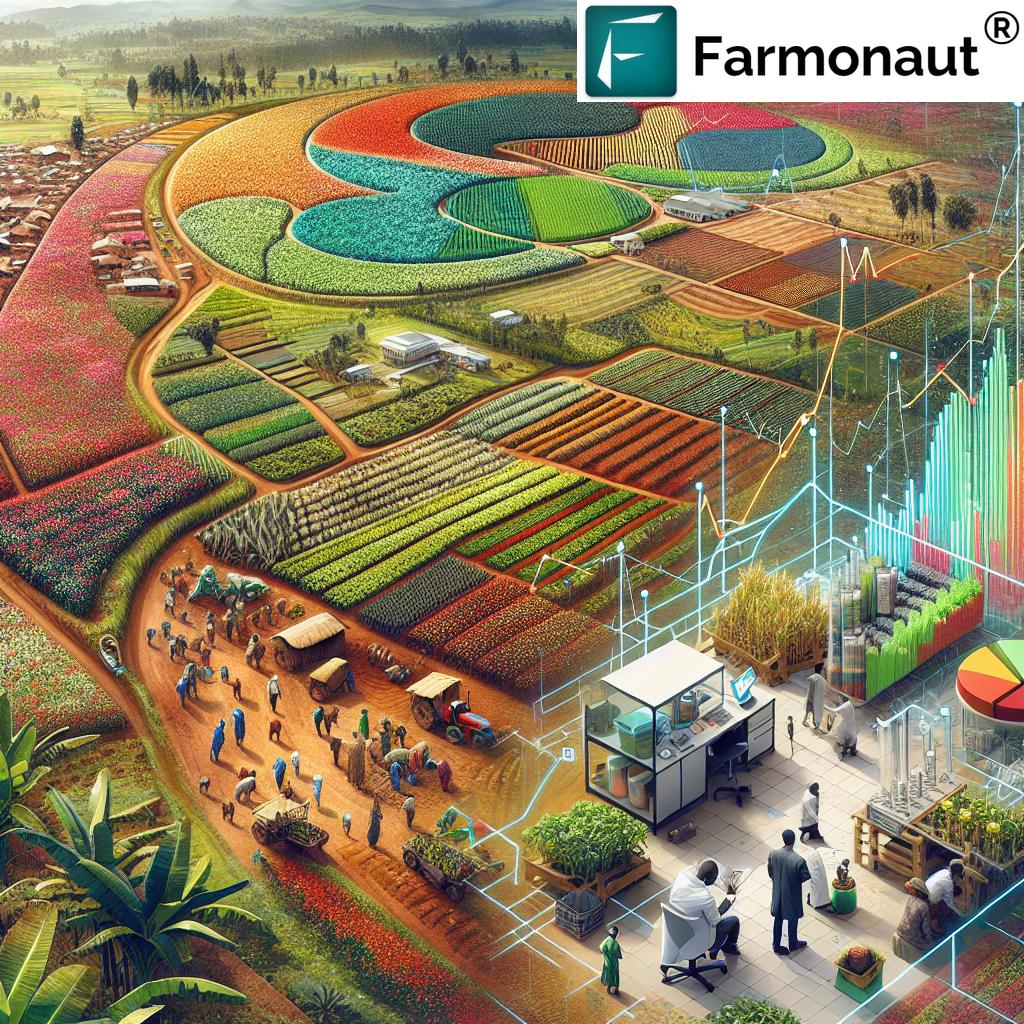
The Impact of Sustainable Fertilizer Programs on Smallholder Productivity
The implementation of sustainable fertilizer programs in Rwanda has had a profound impact on smallholder productivity. By providing access to tailored fertilizer blends and promoting precision agriculture techniques, these initiatives are addressing some of the most pressing challenges faced by farmers in the region.
Improving Soil Health and Crop Yields
- Customized fertilizer blends address specific soil deficiencies
- Reduction in soil acidity through lime-adjusted fertilizers
- Increased crop yields reported by participating farmers
- Enhanced nutrient uptake efficiency in crops
The focus on soil health is particularly crucial in Rwanda, where soil acidity has long been a limiting factor in agricultural productivity. By addressing this issue head-on with specially formulated fertilizers, RFC is not only improving current crop yields but also ensuring the long-term sustainability of the land.
Empowering Smallholder Farmers
One of the most significant outcomes of these programs is the empowerment of smallholder farmers. By providing them with access to high-quality inputs and the knowledge to use them effectively, these initiatives are enabling farmers to take control of their agricultural destiny.
- Improved access to credit for purchasing agricultural inputs
- Training in precision agriculture techniques
- Enhanced decision-making through soil testing and analysis
- Increased income and financial stability for participating farmers
The ripple effects of this empowerment extend far beyond the farm. As smallholder farmers become more productive and profitable, they contribute to the overall economic development of their communities and the nation as a whole.
Addressing Challenges in Agricultural Input Distribution
One of the most significant hurdles in improving agricultural productivity in Rwanda has been the challenge of distributing inputs, particularly fertilizers, to remote areas. The ACP’s innovative approach to this problem is multi-faceted and promising.
Innovative Solutions for Remote Area Distribution
- Provision of motor tricycles to top-performing agro-dealers
- Development of a more extensive and efficient distribution network
- Utilization of mobile technology for order placement and tracking
- Collaboration with local communities to identify and address distribution gaps
By equipping agro-dealers with the means to reach remote areas more easily, the program is ensuring that the benefits of advanced agricultural inputs are not limited to easily accessible regions. This approach is crucial for achieving equitable agricultural development across Rwanda.
The Role of Technology in Streamlining Distribution
In today’s digital age, technology plays a crucial role in optimizing agricultural input distribution. RFC’s implementation of modern systems for order placement, inventory management, and delivery tracking is revolutionizing the way inputs reach farmers.
- Digital platforms for real-time inventory management
- GPS-enabled tracking of fertilizer shipments
- Mobile apps for farmers to place orders and receive delivery updates
- Data analytics to predict demand and optimize supply chain efficiency
These technological advancements not only improve the efficiency of distribution but also enhance transparency and accountability in the supply chain. Farmers can now have greater confidence in the availability and quality of the inputs they receive.
The Role of Precision Agriculture in Rwanda’s Agricultural Revolution
Precision agriculture is at the forefront of Rwanda’s agricultural transformation. By leveraging advanced technologies and data-driven insights, farmers can optimize their use of resources, leading to increased productivity and sustainability.
Key Components of Precision Agriculture in Rwanda
- Soil mapping and analysis for targeted fertilizer application
- Use of satellite imagery for crop health monitoring
- Weather forecasting for optimal planting and harvesting times
- Variable rate technology for efficient resource use
The implementation of these precision agriculture techniques is not just about increasing yields; it’s about creating a more sustainable and resilient agricultural sector. By using resources more efficiently, farmers can reduce their environmental impact while improving their economic outcomes.
The Impact on Agricultural Economic Zones
The implementation of sustainable fertilizer programs and precision agriculture techniques is having a profound impact on Rwanda’s agricultural economic zones. These zones, designed to boost agricultural productivity and promote agribusiness, are benefiting from the increased efficiency and output brought about by these initiatives.
Transforming Agricultural Landscapes
- Increased crop diversity within economic zones
- Improved soil health leading to sustainable land use
- Attraction of agribusiness investments due to higher productivity
- Development of value-added processing facilities
The transformation of these agricultural economic zones is not just about increasing production; it’s about creating a more diverse and resilient agricultural sector that can withstand economic and environmental challenges.
Supporting Food Security in Rwanda and Beyond
The ultimate goal of these agricultural initiatives is to enhance food security, not just in Rwanda but potentially across the region. By boosting productivity and improving the resilience of agricultural systems, Rwanda is positioning itself as a model for sustainable agriculture in Africa.
Key Contributions to Food Security
- Increased domestic food production reducing reliance on imports
- Improved nutritional quality of crops through balanced fertilization
- Enhanced storage and distribution systems to reduce post-harvest losses
- Development of export capacity for surplus production
The success of these programs in Rwanda offers valuable lessons for other African nations seeking to improve their agricultural sectors and enhance food security. As we continue to face global challenges such as climate change and population growth, the importance of sustainable and productive agricultural systems cannot be overstated.
Comparative Analysis of Agricultural Productivity
To fully appreciate the impact of the sustainable fertilizer program in Rwanda, let’s examine a comparative analysis of key agricultural metrics before and after the program’s implementation:
| Metric | Before Program | After Program |
|---|---|---|
| Average crop yield (tonnes/hectare) | 2.5 | 4.2 |
| Fertilizer usage efficiency (%) | 35 | 65 |
| Soil acidity levels (pH) | 4.5 | 6.2 |
| Number of participating agro-dealers | 150 | 450 |
| Smallholder farmer income (USD/year) | 800 | 1,500 |
| Fertilizer distribution reach (% of remote areas covered) | 40 | 85 |
| Soil testing frequency (tests/year) | 5,000 | 25,000 |
| Crop diversity (number of crop varieties) | 8 | 15 |
| Food security index (scale 1-10) | 5 | 8 |
| Carbon footprint (CO2 equivalent/tonne of produce) | 0.8 | 0.5 |
This table clearly demonstrates the significant improvements across various agricultural and environmental metrics since the implementation of the sustainable fertilizer program. From increased crop yields to improved soil health and reduced carbon footprint, the positive impacts are evident and far-reaching.
The Role of Technology in Advancing Sustainable Agriculture
While Rwanda’s sustainable fertilizer programs are making significant strides, it’s important to recognize the role that technology plays in advancing agricultural practices globally. Companies like Farmonaut are at the forefront of this technological revolution, offering innovative solutions that complement and enhance sustainable agriculture initiatives.
Farmonaut’s satellite-based farm management solutions provide valuable tools for precision agriculture, aligning perfectly with Rwanda’s efforts to optimize resource use and improve crop productivity. Through their android, iOS, and web applications, as well as their API, Farmonaut is making advanced agricultural technology accessible to farmers worldwide.
- Real-time crop health monitoring using satellite imagery
- AI-based advisory systems for optimized farm management
- Blockchain-based traceability for enhanced supply chain transparency
- Resource management tools for efficient farm operations
These technologies can significantly enhance the impact of programs like the ACP in Rwanda, providing farmers and agro-dealers with data-driven insights to make informed decisions about fertilizer use, crop management, and resource allocation.
For those interested in exploring Farmonaut’s solutions:
For developers interested in integrating Farmonaut’s satellite and weather data into their own systems, the Farmonaut API offers powerful capabilities. Detailed information can be found in the API Developer Docs.
Conclusion: A Sustainable Future for Rwanda’s Agriculture
The Agro-dealer Champion Program and the broader sustainable fertilizer initiatives in Rwanda represent a significant leap forward in the country’s agricultural development. By combining innovative distribution methods, precision agriculture techniques, and a focus on soil health, Rwanda is setting a new standard for sustainable agriculture in Africa.
The success of these programs demonstrates the power of collaborative efforts between government agencies, private companies, and local communities. As Rwanda continues to refine and expand these initiatives, the country is not only improving its own food security and economic prospects but also providing valuable lessons for other nations facing similar agricultural challenges.
As we look to the future, the integration of advanced technologies like those offered by Farmonaut with on-the-ground programs like the ACP presents exciting possibilities for further enhancing agricultural productivity and sustainability. With continued investment in research, technology, and farmer education, Rwanda is well-positioned to become a leader in sustainable agriculture, contributing to food security and economic prosperity across the African continent.
Frequently Asked Questions (FAQ)
- What is the Agro-dealer Champion Program (ACP)?
The ACP is a customer loyalty initiative launched by the Rwanda Fertilizer Company to recognize and reward top-performing agro-dealers and farmers who contribute to improving the country’s food system and agricultural input distribution. - How does the fertilizer blending facility in Rwanda contribute to sustainable agriculture?
The facility produces tailored nutrient blends that address specific soil and crop needs, improving fertilizer efficiency and crop productivity while reducing environmental impact. - What role do agro-dealers play in Rwanda’s agricultural system?
Agro-dealers are authorized market agents who distribute subsidized inputs like fertilizers and seeds directly to farmers, playing a crucial role in the agricultural supply chain. - How does the ACP address the challenge of fertilizer distribution in remote areas?
The program rewards top-performing agro-dealers with motor tricycles, enabling them to reach farmers in remote areas more effectively. - What is precision agriculture, and how is it being implemented in Rwanda?
Precision agriculture involves using technology to optimize farming practices. In Rwanda, it includes soil testing, tailored fertilizer blends, and the use of satellite imagery for crop monitoring. - How does the sustainable fertilizer program impact food security in Rwanda?
By increasing crop yields, improving soil health, and enhancing farmer incomes, the program contributes to greater food production and accessibility, thereby improving food security. - What technologies are being used to support sustainable agriculture in Rwanda?
Technologies include advanced soil testing laboratories, satellite-based crop monitoring systems, and mobile applications for agricultural information dissemination. - How can farmers benefit from the Agro-dealer Champion Program?
Farmers benefit through improved access to quality fertilizers, tailored agronomic advice, and potential rewards for loyalty and good agricultural practices. - What is the significance of addressing soil acidity in Rwanda’s agriculture?
Soil acidity is a major limiting factor for crop productivity in Rwanda. By addressing this issue, the fertilizer program helps improve soil health and increase crop yields. - How does the sustainable fertilizer program contribute to environmental conservation?
By promoting efficient fertilizer use and improving soil health, the program helps reduce environmental degradation and lowers the carbon footprint of agricultural activities.









